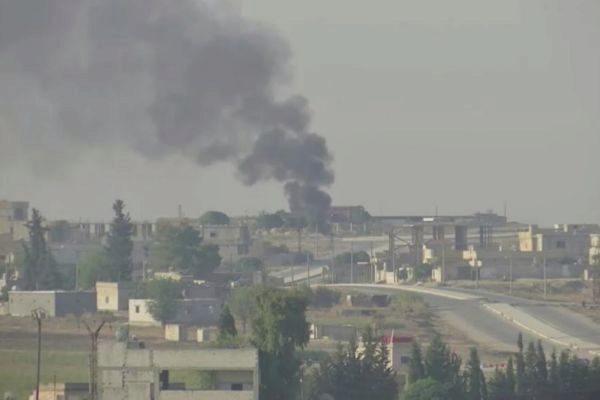- Turkey: Erdogan's operation in Syria: 64,000 displaced in one day and good news for the Islamic State
- Conflict: Turkey launches its ground and air attack against Kurdish forces in Syria
Turkey has intensified this Friday the offensive that it maintains against the border cities of northern Syria controlled by Kurdish militias and allied groups, attacking with aviation and artillery, in a confrontation that sources of local insurgents said that in some villages it is being fought " body to body".
Turkish planes have been reused with special emphasis on the towns of Tel Abyad and Ras al Ain , the main target of Turkish troops. In the latter population, Turkish troops seem to control more than a dozen surrounding villages. The Rojava Information Center itself, an office affecting the administration controlled by the militias of the northern region, acknowledged that the town "is surrounded by three sides."
Marvan Qaishlo , a spokesman for the Syrian Democratic Forces (SDF), the coalition led by Kurdish fighters, acknowledged that the virulence of the fighting has spread to Tel Abyand.
"At this time, Tel Abyad - a Syrian population located on the border of both countries - is attending the most intense battles of the last three days," said Marvan Qaishlo , a spokesman for the Syrian Democratic Forces (SDF), the coalition who lead Kurdish fighters.
" The whole border is it burning , " he added in his remarks to Reuters. The chaos generated in the northern region has even reached one of the main towns in the area, Qamishli, which has suffered a car bomb attack that the Kurdish media attributed to Islamic State activists who are still fighting in the area.
Turkish media say Ankara has mobilized a significant force that includes two armored brigades, two other mechanized infantry, thousands of soldiers from different command and special operations units, and thousands of Syrian paramilitaries linked to the so-called Syrian National Army.
Although it may seem ironic - given the political struggle that Ankara and Tel Aviv have maintained in recent years - the offensive and the entire project of Turkey in northern Syria keeps a huge parallel with Israel's occupation of the southern fringe of the Lebanon from the 80's to the year 2000.
At that time, the Israelis used the same dialectic to justify their offensive - the hypothetical fight against "terrorist groups" - and also resorted to the assistance of allied local paramilitary groups to control a large area of Arab country territory for years.
Now, Kurdish militiamen are trying to curb the advance of Turkish armored vehicles by launching ambushes from tunnels excavated in the border area, a tactic that caused serious losses to the Israelis in Lebanon.
For Bilal Wahab , a Kurdish analyst quoted by Rudawa, despite the clear military supremacy of the Turkish army, the main stumbling block facing Erdogan is also very similar to the one that has always challenged Tel Aviv's designs: let the victory of his soldiers become in a political debacle because of the damage caused to the local population.
"Unlike its military superiority, the legitimacy of the Turkish offensive in Syria has been condemned internationally and will be further accentuated with the increase in civilian casualties and refugees," said the analyst at the Washington Institute for Near East Policy.
For its part, Spain would have notified the Turkish Government that it "will not renew" its Patriot missile battery deployed in Adana which, according to Turkish Foreign Minister Mevlüt Çavusoglu , who has argued that this demonstrates Turkey's need to equip itself of its own air defense system.
"Spain has notified us that they will not renew their contract. There is a rotation and we continue this process with NATO," he said Friday at a joint press conference in Istanbul with the Allied Secretary General, Jens Stoltenberg , when asked about the intentions of Spain not to renew its Patriot missile battery system after the military offensive that Ankara initiated on Monday against Kurdish militias in northeastern Syria, something he would consult with NATO.
More than 100,000 Kurds joined the ranks of the displaced caused by the war in Syria during the last onslaught of the Turkish army against the canton of Afrin last year. The UN says that in just three offensive days the displaced who have fled Tel Abyad and Ras al Ain are already close to 70,000.
The crisis threatens to unleash a significant clash between Turkey and most of the nations of the European Union, where France has already demanded that sanctions be applied against the Government led by Erdogán.
The president of the European Council, Donald Tusk, also replied harshly to the threat of the Turkish leader to allow the refugees he hosts in the territory of his country to move to the rest of Europe. "We will never accept that refugees become a weapon and are used to blackmail us. President Erdogan's threats are totally out of place," he said in a tweet.
The diplomatic setback already shaping up to Erdogan could acquire an unpredictable dimension to the notice received by the Secretary of Defense, Mark Esper, who warned that Turkey faces "serious consequences" if not "stopped" immediately their offense.
According to the criteria of The Trust Project
Know more- Syria
- Turkey
- Islamic State
- Refugees
Conflict Turkey says Spain has notified it that it will "not renew" its Patriot missile battery
TurkeyErdogan threatens Europe: "We will open the doors and send you 3.6 million immigrants"
Middle East Erdogan's operation in Syria: 64,000 displaced in one day and good news for the Islamic State

